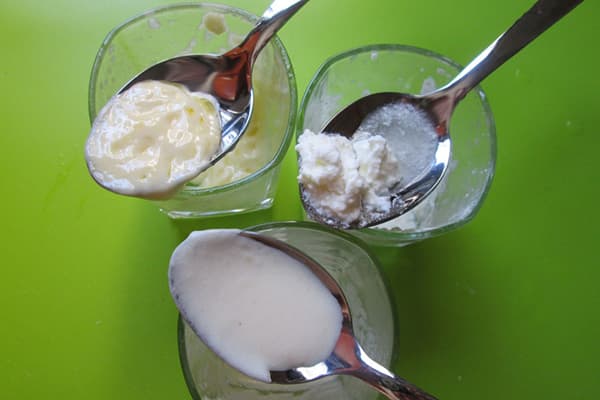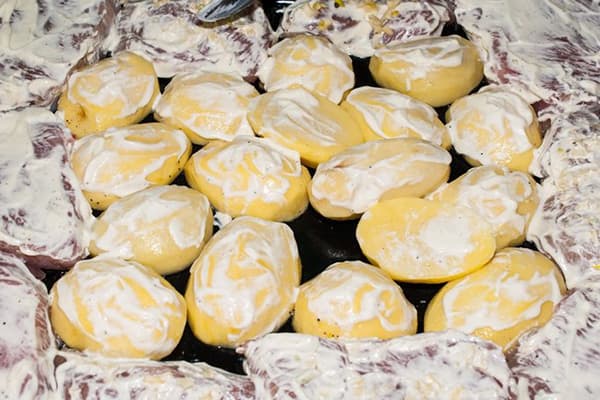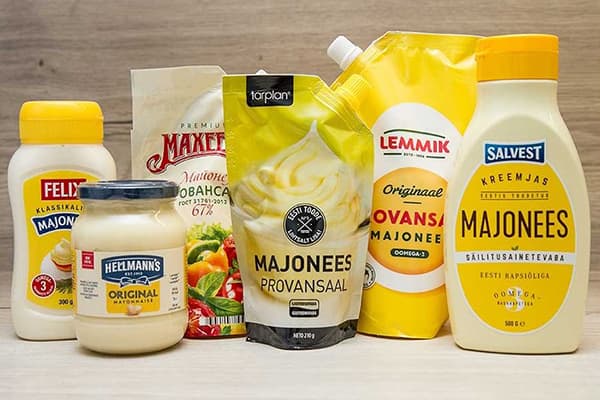Why is it said that mayonnaise cannot be heated?
Every year, an increasing number of people are leaning towards a healthy diet, are interested in the chemistry of food and the effect of various products on the body. Many have heard that it is impossible to heat mayonnaise. And there are 2 reasons for this - stratification of the sauce under the influence of high temperatures and the release of substances harmful to health. Hot dishes prepared using mayonnaise strike the stomach and liver. This is a cold sauce, and properly use it for dressing - and nothing else.
Why not?
First of all, it is worth explaining that mayonnaise is different.
Homemade sauce is fundamentally different from industrial. At home, the hostesses have the goal of turning raw egg yolks, olive oil, lemon juice and mustard into an emulsion. The mass should be a homogeneous, elastic, creamy consistency. If you cook the mayonnaise correctly, then it has a very delicate taste. The downside is that when heated to 65 degrees and above, the substance decomposes and turns into vegetable oil interspersed with other products.
Industrial mayonnaise cannot be heated for completely different reasons. Any emulsion in itself is unstable. It is easily oxidized and decomposes into components. Therefore, manufacturers add a large number of stabilizers to mayonnaise. And in order to save money and to be able to sell the product at an affordable price, instead of fresh eggs, substitutes or individual ingredients are put in the sauce (in the best case, egg yolk powder). Shop mayonnaise is a set of food additives, powders, emulsifiers, stabilizers, preservatives. All these elements react with each other when heated. Hazardous substances are released.
Mayonnaise is a cold sauce that is not intended for heating and cooking hot dishes.
Negative consequences
Damage from mayonnaise when heated is possible only if it is industrial and made from surrogates. Check it out is simple enough. You need to heat a small amount of sauce in a pan. In the case of using natural ingredients, it will very soon turn into vegetable oil with white impregnations - you can even fry something on it. And if the composition is not natural, then when heated, it will be possible to observe a milky-white gurgling mass, which will soon begin to burn.
What is so harmful in industrial mayonnaise, and how is it dangerous to health when heated?
- It can provoke allergies and poisoning. The preservative sodium benzoate contained in mayonnaise, when heated, decomposes into benzophenone and dimethyl carbonate. The first substance is the strongest allergen. Dimethyl carbonate in an acidic environment (and sour mayonnaise) under the influence of high temperatures releases methanol, which transforms into formaldehyde poison.
- Increases the risk of cancer. The taste enhancer monosodium glutamate, mustard, and many “E” form carcinogens when heated to 90 degrees and above, which cause cancer of the bladder and brain.
- Gives stress to the stomach and liver. Mayonnaise refers to high-calorie sauces, enhances appetite, but is digested with great difficulty. Typically, dishes with its addition are absorbed in exorbitant amounts, and after a person is tormented by heaviness in the stomach. The liver is forced to work in an enhanced mode to remove all the harmful substances released during heating. And sooner or later the digestive system may fail.
Additives in industrial mayonnaise are thermally unstable. Their very presence in the composition casts doubt on the benefits of the product.Even taking into account the fact that, according to the results of the studies, they themselves are not dangerous to human health, many are wary of consuming purchased sauce for food. Heated mayonnaise is doubly dangerous! And although no one tested it for harm in this form (for the sole reason that it is used cold), it is not necessary to cook hot dishes on it. In a professional kitchen, this is not accepted. There are many other ways to give your dishes a spicy flavor. You can add olive oil, yolks, lemon juice separately. Or replace mayonnaise with sour cream, yogurt, cream, bechamel sauce.


